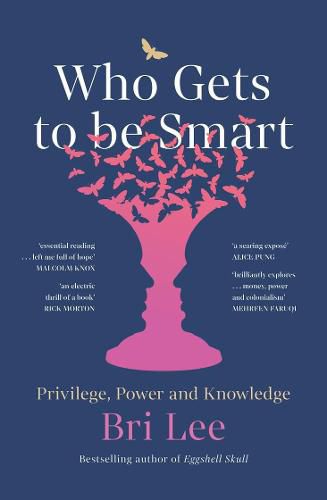Readings Newsletter
Become a Readings Member to make your shopping experience even easier.
Sign in or sign up for free!
You’re not far away from qualifying for FREE standard shipping within Australia
You’ve qualified for FREE standard shipping within Australia
The cart is loading…






In 2018 Bri Lee’s brilliant young friend Damian was named a Rhodes Scholar, an apex of academic achievement. When she goes to visit him and takes a tour of Oxford and Rhodes House, she begins questioning her belief in a system she has previously revered, as she learns the truth behind what Virginia Woolf described almost a century earlier as the ‘stream of gold and silver’ that flows through elite institutions and dictates decisions about who deserves to be educated there. The question that forms in her mind drives the following two years of conversations and investigations: who gets to be smart?
Interrogating the adage, ‘knowledge is power’, and calling institutional prejudice to account, Bri once again dives into her own privilege and presumptions to bring us the stark and confronting results. Far from offering any ‘equality of opportunity’, Australia’s education system exacerbates social stratification. The questions Bri asks of politics and society have their answers laid bare in the response to the Ramsay Centre for Western Civilisation, COVID-19, and the Black Lives Matter protests of 2020.
$9.00 standard shipping within Australia
FREE standard shipping within Australia for orders over $100.00
Express & International shipping calculated at checkout
In 2018 Bri Lee’s brilliant young friend Damian was named a Rhodes Scholar, an apex of academic achievement. When she goes to visit him and takes a tour of Oxford and Rhodes House, she begins questioning her belief in a system she has previously revered, as she learns the truth behind what Virginia Woolf described almost a century earlier as the ‘stream of gold and silver’ that flows through elite institutions and dictates decisions about who deserves to be educated there. The question that forms in her mind drives the following two years of conversations and investigations: who gets to be smart?
Interrogating the adage, ‘knowledge is power’, and calling institutional prejudice to account, Bri once again dives into her own privilege and presumptions to bring us the stark and confronting results. Far from offering any ‘equality of opportunity’, Australia’s education system exacerbates social stratification. The questions Bri asks of politics and society have their answers laid bare in the response to the Ramsay Centre for Western Civilisation, COVID-19, and the Black Lives Matter protests of 2020.
Bri Lee’s first book, Eggshell Skull, interrogated the failure of the Australian legal system to protect and advocate for victims of sexual assault. Lee’s ability to blend her own deeply personal story with a complex critique of systemic failure resulted in an engaging and exhilarating book which rightly won a whole host of literary awards.
In this second book, Lee turns her attention to education. It begins with a trip to Oxford University where she is visiting a friend who has been granted a Rhodes Scholarship. She is surprised by her own feelings of awe and reverence but also of inadequacy and exclusion. In asking the question ‘who gets to be smart?’ Lee engages with ‘kyriarchy’, a concept withroots in feminist theory that is eloquently used by Behrouz Boochani in No Friend but the Mountains to describe Manus prison. Lee came to know Boochani’s translator Omid Tofighian on the writers’ festival circuit and he says to her that ‘academia is second only to Manus prison in terms of being the most violent and cruel institution I have ever encountered’. Kyriarchy is a way of conceptualising the accumulation and preservation of power through intersecting hierarchal institutions and their systems of oppression (such as racism, classism, and sexism), and Lee uses its lens here to investigate the education system as a whole. Lee looks at how educational inequality becomes entrenched early in Australia within the two-tiered private and public school system. She explores the works of non-Western thinkers who point to the domination of the Western scientific method of measuring ‘intelligence’, and its profound effect in the silencing and ‘othering’ of non-Western knowledge.
Helen Garner has praised Lee for her ‘scorching, self-scouring’ style and it is easy to draw favourable comparisons between the two writers. Both are keen and insightful observers of themselves and others and both are deeply interested in questions of justice and power.
See what the Readings’ team have to say on the blog, discover related events and podcast episodes.
Bri Lee is an Australian author, journalist and activist, best known for her 2018 memoir Eggshell Skull. In 2024 she released her first novel, The Work.